
ADVERTISEMENT
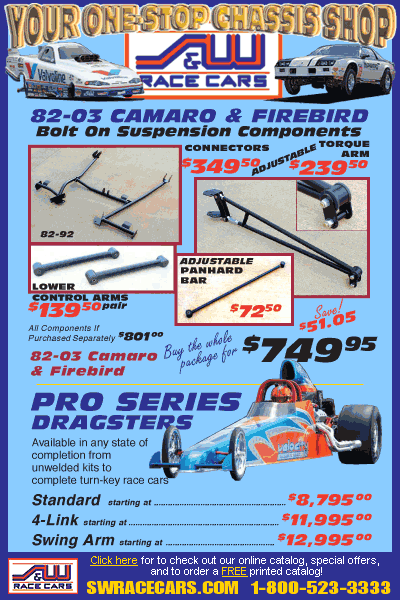
|
Most Mopar racers have tried
grinding the rocker arm for additional clearance, installing
the smallest diameter and strongest valve springs and even
trimming the edges of titanium retainers so they would clear
the rocker arms. These all work, but only temporarily, as
the grinding weakens the rocker arm and it is inevitable that
it will fail prematurely. Personally, breaking two to four
rocker arms and the resulting damage to roller lifters and
pushrods was getting old. I was lucky in that I have never
really hurt anything else, but breaking an exhaust rocker
and putting the extra pressure on that cylinder’s connecting
rod and bearing could cause a major engine failure.
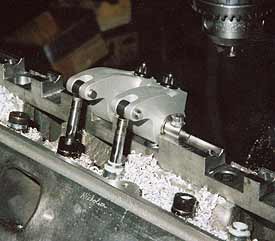
First trial
fit. The mounting plate is in place and torqued down.
The rocker arms are assembled and bolted down in pairs.
We are using 1: 6: 1 ratio and exhaust is offset .750"
on Indy 440-1 heads.
|
I started looking around for
a cure for this common Mopar problem. I ended up talking to
Jesel Rocker Arms at the PRI Show last winter. I looked over
what they offered and decided it was time to bring modern
technology to my 970 H.P. Mopar. The Pro Series kit for my
model 440-1 Indy Cylinder Heads comes with the absolute finest
mounting hardware, detailed instructions, fixtures to assure
proper rocker arm shaft height, and a reputation for the finest
rocker arms available at any cost.
Rather than keep you guessing, a Pro-Series Jesel rocker
arm assembly for the 440-1 Mopar heads will set you back about
$1400.00 if you go for the extra milling to lighten them up
even more. Standard kits for the Mopar run about $1200.00
for Mopars and a few hundred less for Chevrolets.
Installation and prep work is very well explained and diagramed
in the installation instructions. There is a bit more involved
when doing a Mopar because the rocker shaft pedestals have
to be milled off so the new Jesel Rocker Arms can be bolted
to their mounting plate.
I trusted the machine work and milling to R&J Performance
in Hudson, IA. Keith “Woody” Briden has done work
for me for over 15 years and just like in the past I was not
disappointed. The photos pretty much tell the story of setting
up the Indy heads (or any big block Mopar head for that matter)
for the milling process to remove the rocker shaft pedestals.
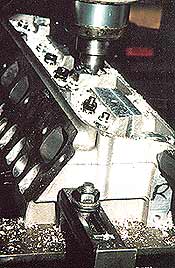 |
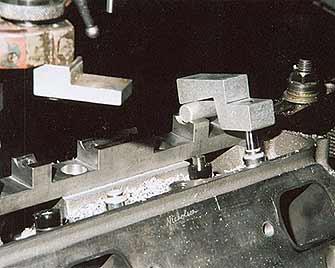 |
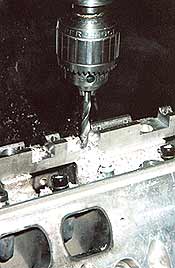 |
| Initial milling on the
rocker shaft pedestals. They were milled down .600"
then trial fitting started. |
This is the fixture that
Jesel supplies to let the machinist know when the depth
of the milling is correct. The fixture will fit flat on
the top of the valve when the height of the mounting plate
is correct. |
After the plate height
is correct, the mounting plate needs to be bolted down.
This requires using the five original threaded holes and
adding four more so the billet plate does not flex. |
The fixture Jesel provided to assure proper installed height
of the mounting plate is simple to use and deadly accurate,
as it all came out just right. As in all machining accuracy
and patience will produce the results you are looking for.
In this case the Jesel Rocker Arm system went together as
designed.

|
